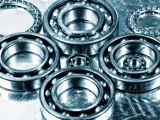What is the Difference Between M50 and 52100 Bearing Steel?
If you're looking for a high-performance steel for bearings and other demanding applications, M50 and 52100 are two popular choices. But what exactly is the difference between these two bearing steels? Here at Dynamic Metals, we'll explain the key similarities and differences so you can select the best option.
Overview of M50 and 52100 Bearing Steel
M50 and 52100 function as high carbon chromium bearing steel types. Their principal alloying components include approximately 1% carbon and 1.5% chromium. High levels of carbon produce a metal's hardness and its ability to resist wear during use as chromium makes it shielded from corrosion forces.
These types of steels serve many applications such as ball bearings and roller bearings because of their superior hardness which also gives them enduring strength and resistance to mechanical fatigue. The properties and applications of the M50 and 52100 steels exhibit significant distinctions according to industry analysis.
Key Differences Between M50 and 52100
- Carbon Content
The primary difference lies in their carbon content. M50 has a slightly higher carbon level at 0.85-1.05% versus 0.98-1.10% for 52100. This gives M50 higher achievable hardness and wear resistance compared to 52100.
- Alloying Elements
In addition to chromium, M50 contains small amounts of other alloying elements like molybdenum, vanadium, and tungsten. 52100 is simpler with essentially just iron, carbon, and chromium.
- Heat Treatment Response
The higher alloy content of M50 means it responds better to heat treatment than 52100. Properly heat treated M50 typically reaches hardness levels around 64-66 HRC, while 52100 maxes out at around 62 HRC.
- Toughness
Greater hardness comes at the expense of reduced toughness. M50 is the harder and less tough of the two steels. So, 52100 would be the better choice for applications where resilience to shock loads is critical.
- Corrosion Resistance
The higher chromium content of 52100 gives it better corrosion resistance compared to M50. So, 52100 is preferred for wet environments or acidic conditions.
When to Use M50 vs 52100?
With its higher achievable hardness and wear resistance, M50 is best for applications like:
- Precision bearings for high-speed machining
- Cutting tool bearings
- High wear parts
M50 is typically used in:
- Aircraft engine bearings
- Applications to high-speed turbines
- Aerospace gearboxes
- Military equipment
52100 offers the better balance of hardness, toughness, and corrosion resistance for uses like:
- Large bearings subject to shock loads
- Wet environment applications
- Mission-critical bearings requiring resilience
52100 excels in:
- Automotive bearings
- Industrial machinery
- Roller bearings
- General applications ball bearings
Get Expert Guidance from Dynamic Metals
The development of engineering applications keeps the M50 and 52100 materials dominant as selections in bearing steel usage. New heat treatment methods have expanded the functional range of both materials enabling wider support for different applications.
Both M50 and 52100 deserve recognition as outstanding bearing steels because each material offers unique properties adapted to varied industrial purposes.
Your ability to determine the best choice for your needs emerges from a good understanding of what separates these two engineering materials. Both M50 and 52100 are essential materials for modern engineering use including aerospace applications because M50 provides heat resistance and 52100 delivers economical durability.
We hope this overview gives you a better understanding of how M50 and 52100 bearing steels differ. To discuss the best steel for your specific application, contact the experts at Dynamic Metals. We stock a wide range of specialist bearing steels, M50 bars (AMS 6491) and provide heat treatment services to optimise properties. Our technical team can offer guidance to ensure you specify the ideal bearing steel for performance, longevity, and safety.
Need more information? Get in touch

